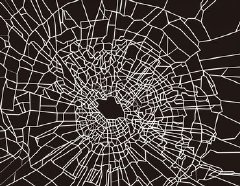Apr 3 2009
Wine glasses that don't shatter? Baby bottles that don't break?
Coffee mugs that last generations?

All are possible with a new process for strengthening glass and ceramics developed
by an Alfred University
researcher.
Alfred University has signed a royalty agreement with Santanoni Glass and Ceramics,
Inc., of Alfred Station, NY, for proprietary technology related to the strengthening
of glass.
The process allows Santanoni to produce “unbreakable” glassware
such as wine glasses, canning jars, bottles, tumblers, goblets and mugs at a
cost that allows the products to be competitive with normal, un-strengthened
glassware.
Dr. William LacCourse, a professor of Glass Science at the New York State College
of Ceramics at Alfred University, and president of the company, located in the
Ceramics Corridor Innovation Center in Alfred, has researched processes for
strengthening glasses for more than 30 years.
“No glass is unbreakable, but our process produces the highest strength
glassware available today, and at price that makes it affordable,” said
LaCourse. “It has the potential to save restaurants, catering services
and families up to 80 percent, and perhaps more, on their glassware costs. We
have dropped glass bottles from 10 feet high onto a concrete floor, and the
glass simply bounces.”
Under the agreement, Santanoni will have access to the technology developed
by LaCourse and his graduate students. The glassware will be processed in Alfred
Station, NY at the Sugar Hill Industrial Park, and will be marketed nationally.
“We are working with a couple of distributors for some specialty products,
but will do the majority of consumer marketing through gift shops and the Internet.
We are also contacting various food service companies where we believe the products
can save them thousands of dollars per year due to reduced breakage and lower
inventory costs.”
Alfred University President Charles Edmondson heralded the agreement with Santanoni
Glass, calling it “significant for Alfred University and the Southern
Tier. It is an indication of how our high-tech materials research can generate
job creation and economic growth.”
Over the years the research was partially funded by Alfred’s Center for
Advanced Ceramic Technology (CACT), as well as Santanoni. “The help of
our CACT was critical in getting the company started. We could not have done
it with out its constant support. I owe a lot to the CACT and especially to
Alfred University for providing the laboratories, equipment and financial support,”
said LaCourse. “It is time to pay back.”
Santanoni’s Ultra-HS glass products are now available in limited quantities
as the company prepares to ramp up production levels.